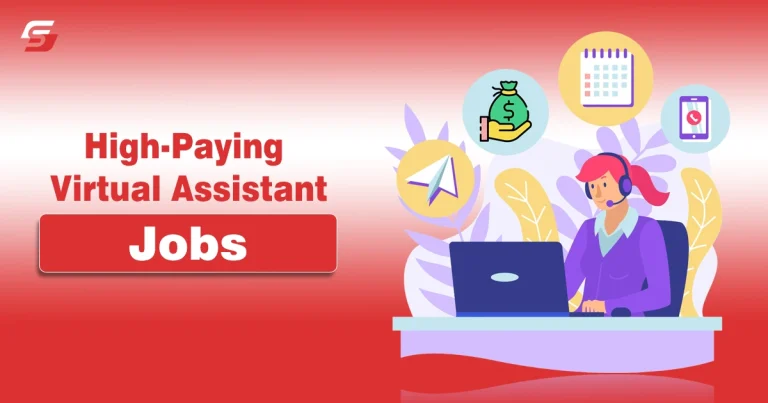The world of work has changed forever. Gone are the days when office desks and 9-to-5 routines were the only way to earn a good living. Today, virtual assistant jobs are helping people around the world build successful careers right from the comfort of their homes.
Whether you’re a stay-at-home parent, a student looking for flexible work, or a professional seeking independence, the virtual assistant industry offers a wide range of options to fit your lifestyle. What makes these jobs so appealing isn’t just the freedom or flexibility—it’s the earning potential.
Many top-paying virtual assistant jobs now rival traditional full-time salaries. From managing online businesses and real estate schedules to handling podcast editing or bookkeeping tasks, skilled VAs are in high demand. Here we will break down the best-paying roles, the tools you’ll need, and how you can get started today, even with zero experience.
“Success in the virtual assistant world isn’t about doing it all—it’s about mastering what you do best.”
How to Become a Successful Virtual Assistant (Even as a Beginner)
Becoming a successful virtual assistant doesn’t happen overnight, but with the right steps, tools, and mindset, you can launch a rewarding career from your living room.
Whether you’re just exploring your options or ready to jump in, here’s a roadmap that covers all the essentials. These steps are perfect for beginners and experienced professionals alike.
1. Choose Your Niche and Skills
Before applying for virtual assistant jobs, ask yourself: What am I good at? Maybe you love writing, have a talent for organizing, or know your way around social media. Identifying a niche helps you stand out in a crowded market and charge more for specialized services.
Popular VA niches include:
- Social media management
- E-commerce support
- Real estate admin
- Executive assistance
- Bookkeeping
- Customer service
2. Learn the Right Tools (Trello, Slack, Asana, Canva)
Great virtual assistants know how to use the tools that make remote work efficient. These tools not only improve productivity but also make you more appealing to clients.
Must-learn tools:
| Tools | Best For |
|---|---|
| Trello & Asana | Project management and task tracking |
| Slack | Team communication |
| Canva | Design social media graphics, presentations, and more |
| Google Workspace | Gmail, Docs, Sheets, and Drive essentials |
| Zoom | Hosting or joining virtual meetings |
Mastering even two or three of these tools can land you higher-paying gigs.
3. Build an Online Portfolio
Think of your portfolio as your digital resume—except better. It should showcase your skills, highlight your best work, and make clients trust your expertise.
What to include in your portfolio:
- Short bio with your niche focus
- Sample work
- Testimonials or reviews (if available)
- Contact form or call-to-action
Use free platforms like Notion, Google Sites, or Carrd to build a simple yet professional portfolio.
4. Join Top VA Job Platforms
To land your first client, you need to be where clients are looking. Signing up on trusted freelance platforms increases your visibility and lets you apply for jobs every day.
Top platforms to start with:
- Upwork
- Fiverr
- Freelancer
- PeoplePerHour
- Belay (for more professional roles)
- Boldly and Time Etc. (premium VA companies)
Create a compelling profile with a clear title like: “Experienced Shopify Virtual Assistant” or “Reliable Executive Assistant for Busy CEOs.”
5. Apply Strategically and Professionally
Don’t just send the same proposal to every job. Clients can tell. Instead, tailor your application to show how you can solve their specific problem.
Checklist before applying:
- Read the job description carefully
- Use the client’s name (if available)
- Offer a solution, not just your services
- Share relevant experience or samples
- Keep it short and friendly, not robotic
6. Keep Learning & Upskilling
The virtual world moves fast, and so should your skills. Whether it’s learning a new tool, taking a short course, or watching YouTube tutorials, make learning a weekly habit.
Free & affordable resources:
- Coursera, Udemy, and Skillshare for structured courses
- HubSpot Academy and Google Digital Garage for marketing and tech skills
- YouTube for quick how-tos
- LinkedIn Learning for business tools
The more skills you have, the more valuable (and higher-paid) you become.
Top-Paying Virtual Assistant Jobs
1. Executive Virtual Assistant – Best for Experienced Admins
An Executive Virtual Assistant (EVA) offers high-level administrative support to C-suite executives, business owners, or entrepreneurs. This role is designed for professionals who can handle sensitive tasks such as calendar management, travel bookings, internal communications, and confidential reports.
Why You Should Do It
If you have experience as an executive assistant, office manager, or in administrative roles, this is your chance to work remotely with better flexibility and higher pay. The demand for EVAs is growing as companies go remote and outsource leadership support functions.
What It Requires
It requires:
- Strong organizational skills
- Excellent written and verbal communication
- Ability to multitask under pressure
- Familiarity with business etiquette
Tools Needed
| Tools | Google Workspace or Microsoft OfficeCalendly (for scheduling)Zoom or Google MeetSlack or Microsoft TeamsNotion or Evernote |
Pros and Cons
Pros:
- High pay and long-term client retention
- Work directly with influential decision-makers
- Strong potential for career growth (e.g., remote COO)
Cons:
- Can be high-pressure and demanding
- Requires prior experience in executive support
- Irregular working hours may be needed
How Much You Can Earn
You can earn an average $67,163 per year.
Future Scope
With the shift to virtual leadership teams, the demand for skilled executive VAs is growing rapidly, especially among startups and solopreneurs who need premium admin support without full-time hires.
2. E-Commerce Virtual Assistant – Great for Shopify or Amazon Experts
An E-Commerce Virtual Assistant is someone who helps online store owners with daily tasks from home. They work on websites like Amazon, Shopify, or Etsy.
Their job is to add new products, update prices, check stock, answer customer questions, and make sure orders are delivered properly. These assistants make it easier for business owners to run their online stores without doing everything by themselves.
Why You Should Do It
E-commerce continues to grow, with global retail e-commerce sales expected to reach $6.8 trillion by 2028.
What It Requires
- Knowledge of online marketplaces (Amazon, eBay, etc.)
- Attention to detail
- Basic SEO and keyword knowledge
- Customer service skills
Tools Needed
| Tools | Shopify, Amazon Seller CentralHelium 10 or Jungle ScoutCanva (for product images)Google Sheets or ExcelOberlo or DSers (for dropshipping) |
Pros and Cons
Pros:
- High demand in the growing e-commerce sector
- Flexible job types across platforms (Amazon, Shopify)
- Opportunity to specialize and charge premium rates
Cons:
- Repetitive and operational tasks
- Requires ongoing learning due to platform updates
- Technical setup can be complex initially
How Much You Can Earn
$15–$35/hour based on your expertise and the size of the store you manage.
Future Scope
As more small businesses turn to online sales, the need for experienced e-commerce VAs will continue to rise. Specialized skills like Amazon SEO or product research can push your rates even higher.
3. Social Media Virtual Assistant – Ideal for Creatives
A Social Media VA helps businesses or individuals manage their social media pages like Instagram, Facebook, or TikTok. Their job is to create posts, schedule them at the right time, reply to comments or messages, and track how well the posts are doing. They help brands stay active online without the owner doing everything themselves.
Why You Should Do It
If you’re passionate about online trends, content creation, or marketing, this job gives you a chance to work creatively with clients across industries.
What It Requires
- Knowledge of social platforms
- Creativity and design sense
- Good writing skills
- Ability to schedule and manage engagement
Tools Needed
| Tools | Buffer or Hootsuite (scheduling), Canva, Adobe Express, Later, Metricool, Google Analytics, Meta Business Suite |
Pros and Cons
Pros:
- Offers creativity and personal expression
- Flexible schedule and project types
- Growing demand among small businesses and influencers
Cons:
- Time-sensitive tasks like posting and engagement
- Multiple platform management can be overwhelming
- Frequent algorithm changes require constant adaptation
How Much Can You Earn
$24/hour depending on skill level, platforms covered, and content complexity.
Future Scope
As video content and influencer marketing grow, social media VAs with content editing or TikTok strategy skills will command premium rates.
4. Real Estate Virtual Assistant – Fast-Growing in the U.S. Market
Real Estate VAs helps real estate agents or property managers with their daily work. This includes scheduling appointments, updating property listings, sending emails, and managing contacts. They make the realtor’s job easier by handling the behind-the-scenes tasks, so agents can focus on selling homes.
Why You Should Do It
The real estate market demands quick turnarounds and strong client service. Reliable VAs are rewarded with long-term contracts and bonuses.
What It Requires
- Basic understanding of real estate workflows
- Good communication and coordination skills
- Familiarity with lead tracking
Tools Needed
| Tools | CRM software (Zoho, Follow Up Boss), MLS (Multiple Listing Services), Google Calendar, GmailDocuSign, Dropbox |
Pros and Cons
Pros:
- Stable, long-term relationships with realtors
- High earning potential with bonus structures
- Learn valuable insights about the real estate industry
Cons:
- Requires familiarity with U.S. real estate terms
- Weekend or evening availability may be expected
- CRM systems can have a learning curve
How Much Can You Earn?
A real estate virtual assistant can earn $23/hour.
Future Scope
With more agencies going remote, VAs with U.S. real estate experience will be highly sought after.
5. Bookkeeping Virtual Assistant – Best for Finance-Savvy People
Bookkeeping VAs help businesses keep track of their money. They record income and expenses, make invoices, track payments, and organize financial reports.
This helps business owners know how their money is being spent and saves them time. Bookkeeping VAs usually work with tools like QuickBooks or Excel while working from home.
Why You Should Do It
It’s a high-trust, high-paying field. If you’re detail-oriented and good with numbers, this role provides consistent work and excellent long-term opportunities.
What It Requires
- Understanding of basic accounting principles
- Accuracy and confidentiality
- Familiarity with financial documents
Tools Needed
| Tools | QuickBooks, Xero, or FreshBooksGoogle Sheets / ExcelWave or Zoho Books |
Pros and Cons
Pros:
- Consistent high pay for specialized skills
- Long-term recurring projects from loyal clients
- Trusted, high-responsibility position
Cons:
- Requires accuracy and attention to detail
- May need accounting certifications or experience
- Can involve repetitive financial tasks
How Much Can You Earn
$24/hour is the average salary of a virtual bookkeeper.
Future Scope
The future of bookkeepers is very bright, and you can grow more if you have the skills of AI and automation. VAs who offer tax prep or cash flow forecasting can further boost their value.
6. Podcast Virtual Assistant – Rising in the Creator Economy
Podcast VAs help podcast creators with tasks like editing audio, writing episode notes, uploading episodes, and scheduling guest interviews. They take care of the technical and planning work so the host can focus on recording great content. It’s a creative job that lets you support people in the growing podcast industry, right from your home.
Why You Should Do It
With over 584.1 million podcast listeners globally in 2025 and growing, this niche is full of opportunity for creative and tech-savvy VAs.
What It Requires
- Good listening and writing skills
- Basic audio editing
- Project and guest coordination skills
Tools Needed
| Tools | Audacity, GarageBand, Descript, Buzzsprout, Libsyn, Trello (episode planning) |
Pros and Cons
Pros:
- High demand as podcasting grows
- Creative work with flexible hours
- Weekly recurring projects are common
Cons:
- Audio editing skills and software are essential
- Tight episode deadlines can be stressful
- Requires strong written and communication skills
How Much You Can Earn
$30–$50/hour depending on services and editing complexity.
Future Scope
As podcasting continues to explode, VAs who can offer full-service production and promotion support will be in high demand.
7. Content Writing Virtual Assistant – Perfect for Writers
These VAs help businesses write things like blogs, emails, website pages, and social media captions. They ensure the writing is clear, helpful, and sometimes optimized for search engines (SEO). These VAs work from home and help clients share their message with the world in a professional way.
Why You Should Do It
If you love writing and research, content VAs offer a creative outlet with the potential to earn good money while building your writing portfolio.
What It Requires
- Strong grammar and spelling
- SEO knowledge
- Ability to meet deadlines
Tools Needed
| Tools | Grammarly, Hemingway Editor, WordPress, GhostSurfer, SEO, Yoast SEO |
Pros and Cons
Pros:
- Ideal for creative and expressive individuals
- Remote-friendly and flexible
- Builds strong portfolio and SEO expertise over time
Cons:
- Quality and consistency are critical
- Writer’s block can affect productivity
- Highly competitive market for freelance writers
How Much You Can Earn
$15–$40/hour based on writing skill, niche, and SEO ability.
Future Scope
Content remains king. Brands, startups, and influencers constantly need writing help, so skilled VAs who understand SEO will always be in demand.
Sum Up
The best part about virtual assistant jobs is that you can start small and grow big. Starting your journey as a virtual assistant may feel overwhelming at first, especially with so many niches to explore.
But remember: every successful VA once started from scratch. What matters most is identifying your strengths, learning the right tools, and committing to consistent improvement. With the rise of remote work and the global demand for online support, this career path is more promising than ever
People Also Ask
What skills do I need to be a virtual assistant?
You need time management, communication, and digital skills. Learning tools like Trello, Canva, Zoom, and Slack will boost your chances.
Can I become a virtual assistant without experience?
Yes. Start with customer service or data entry VA roles. Build your skills and portfolio as you go.
What is the highest-paying virtual assistant job?
Bookkeeping and executive VAs often earn the most, up to $60–$70/hour with experience.
How do I find virtual assistant jobs from home?
Use platforms like Upwork, Fiverr, Freelancer, and specialized sites like Belay, Time Etc, and Boldly.









